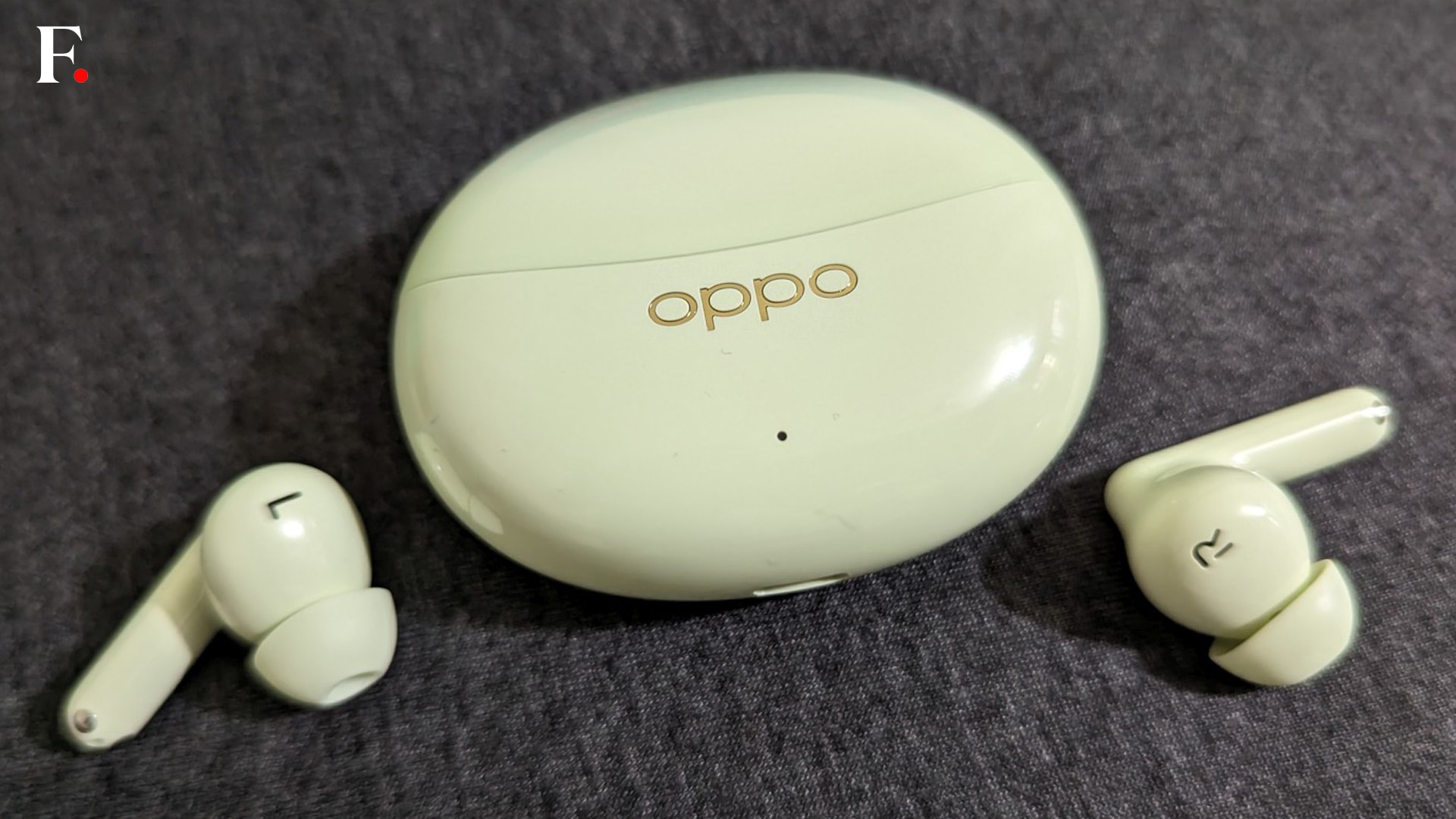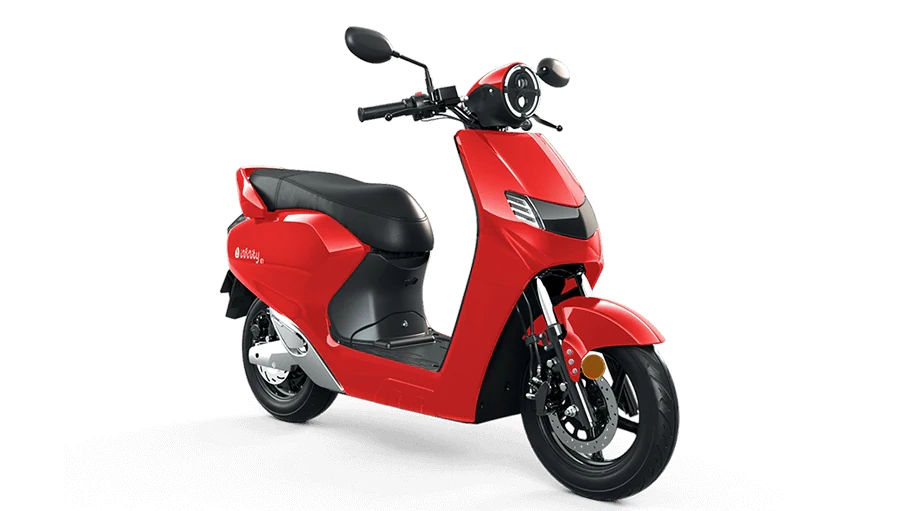Pros:
– Very good sound quality for the segment
– Support for LDAC codecs – in multipoint mode too
– Effective active noise cancellation
– Neat design, comfortable in-ear fit, wear detection
– IP55-rated dust and splash resistance
– Configurable controls; volume control on the buds
– Good call quality, multipoint support
Cons:
– Below-par battery backup with ANC on
– No equaliser to tweak the sound quality
– Midrange performance could have been better
Price: Rs 4,999
Rating: 4/5
Related Articles
We have reviewed a handful of Oppo true wireless (TWS) earbuds over the years, but most of them have either been entry-level models around Rs 2,000 or flagship products priced over Rs 10,000. The brand-new Oppo Enco Air3 Pro sits in the middle and promises a lot of premium features for a lot less money. That was music to our ears even before we actually played some. So let’s take a closer look at what it offers and how it performs.
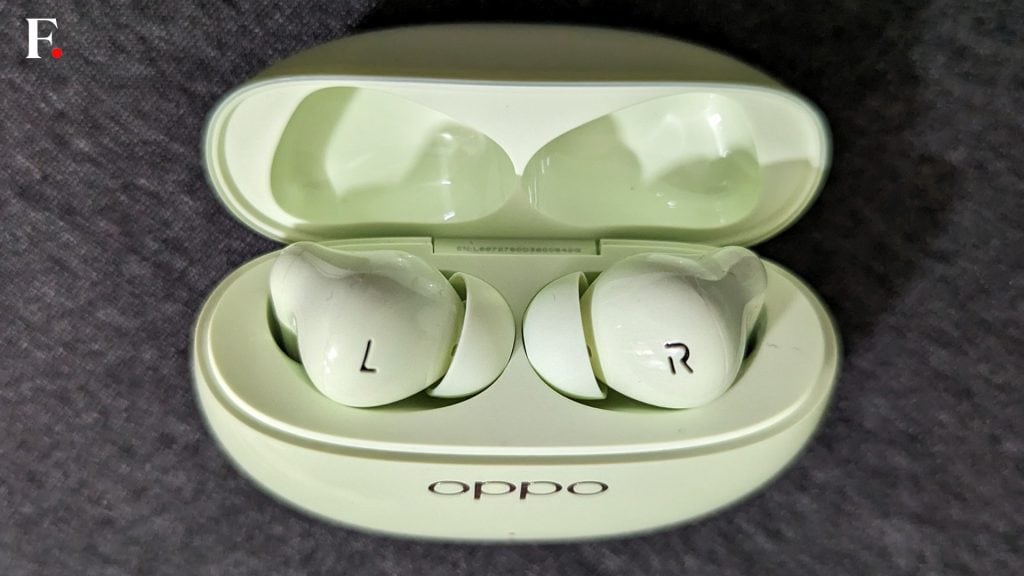
Oppo Enco Air3 Pro: Design and Comfort (8/10)
The design of the Oppo Enco Air3 Pro has been borrowed from its predecessor with the distinct indentations denoting the left and right buds. These stemmed earbuds have a fairly standard shape with a nicely rounded body, and now a new colour. We got the pastel green variant for review, which looks nice. The buds as well as the charging case are painted with the exact shade and a glossy finish. Despite the coat of gloss, fingerprints or smudge marks are barely visible.
The oval case is fairly compact and pocketable. The lid has a translucent finish with a wavy texture at the top. Oppo claims that in comparison to its predecessor, the buds’ stems are 6 per cent shorter, while the charging case is 3.8 per cent smaller. I could not find my vernier callipers to verify the claim. The case weighs under 39 gm while the buds weigh around 4.3 gm each. The build quality of the product leaves no room for complaint.

Each earbud hosts a 43 mAh battery while the case packs 440 mAh that claims to deliver 30 hours of playback on a full charge. We will verify that claim shortly. The case has a tiny power indicator LED at the front and a USB-C charging port at the bottom. There is no physical Bluetooth pairing button here, and you need to wear the earbuds and touch the input area on both buds simultaneously for 4 seconds to get them into pairing mode.
The earbuds have a snug fit and are extremely comfortable to wear for long hours. The silicone tips sit well in the ear canals and provide good passive noise isolation. Three pairs of ear tips are bundled, and it is important to choose the right-sized pair for active noise cancellation (ANC) to work well. The companion app assists you in choosing the right pair in case you can’t decide for yourself. The top area of the stems has a slightly flattened area which is touch-enabled.
Oppo Enco Air3 Pro: Features and Specifications (9/10)
First things first, the Oppo Enco Air3 Pro supports LDAC codecs with Hi-Res certification, which is a rarity in TWS earbuds under Rs 5,000. The Bluetooth 5.3-compliant buds also support AAC and SBC codecs. There is support for Dolby Atmos too if the source device is Atmos-compliant. You get wear detection sensors to pause the audio when you remove a bud from the ear and resume when you put it back in. It works as expected.

The buds have an IP55 rating for dust and splash resistance. So you can wear them to the gym or for a jog in a light drizzle without a worry. However, the case doesn’t have any ingress protection, so be careful with that. Each earbud is fitted with a 12.4 mm dynamic driver made of Bamboo-fibre diaphragm (an industry first) and a couple of microphones for calling and ANC. As per Oppo, the Bamboo-fibre diaphragm is significantly lighter, sturdy and more elastic than traditional Titanium coated diaphragms.
The touch zones at the back of the buds are small but the touch sensitivity is good. You hear a beep every time you tap in the zone, giving you an idea about the number of taps registered for various gestures. You can assign different tasks to gestures through Bluetooth settings on Oppo or OnePlus phones, and using the HeyMelody app on other phones. You can assign play/pause, previous/next tracks, ANC toggle, voice assistant and more to double-tap triple-tap or touch-and-hold gestures.
ANC toggle can only be assigned to touch-and-hold gesture on either bud. Volume control is also available here but can only be assigned to a long touch + hold gesture; I wish one could assign it to one of the simpler gestures. The latency is fairly low for the Enco Air3 Pro, and in Game Mode it can go as low as 47 ms. There was no delay between video and audio when watching videos. The Air3 Pro supports multipoint connections too and one can pair them with two devices simultaneously.
Last but not least, you get active noise cancellation here. You get three ANC modes to switch between — ANC on, ANC off and Transparency mode that lets ambient noise through. The company claims these buds can cancel up to 49 dB of noise, which is among the highest in the segment. And then there is an Adaptive mode too.
Oppo Enco Air3 Pro: Performance (8/10)
Continuing with the topic of ANC, it is quite effective on the Air3 Pro. In the sub-5K segment of TWS earbuds, we rate the ANC on the Realme Buds Air 3 as the best, and the one here is comparable though not better. Decibel numbers aside, the ANC is definitely better than what you get on the OnePlus Buds Z2. It pretty much cuts out low-frequency sounds like the hum of an AC or the whirr of a fan when indoors, and significantly reduces traffic noises too when outdoors. It isn’t as effective against human voices but does reduce them to a point.
There are four noise cancellation modes – Max, Moderate, Mild and Smart, and I could barely tell the difference in performance between the first three. Smart mode automatically sets it to one of the other three modes depending on the quantum of ambient noise. So it is best to leave it on Smart. The Transparency mode remains better on the OnePlus and sounds more natural. Though it is not bad here, there is a mild but constant buzz when you enable it that dampens the voices being let through.
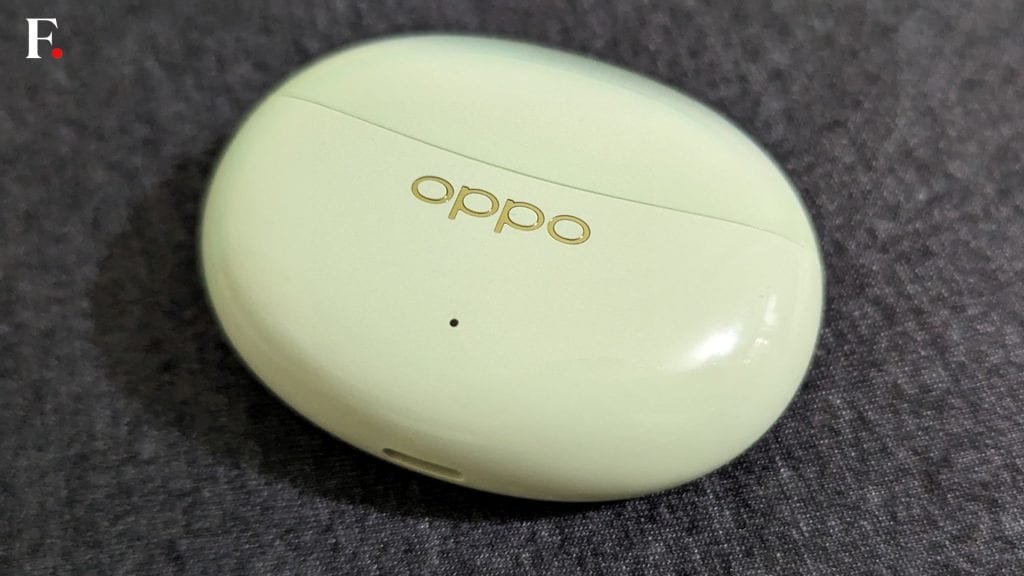
The wireless range is good with a strong connection at 10 metres with no obstruction between the source and the listener. These Oppo buds aren’t the loudest and need to be pushed close to 70 per cent volume when indoors and further up in noisy areas. The good part is, the sound doesn’t crack even at 90 per cent, though you won’t need to go that high in most cases. You get three audio presets – Original sound, Bass boost and Natural inspiration, and they all can be useful, though I found Original sound to be the best.
You get a fairly balanced sound with slightly boosted lows. Though it won’t please the Bassheads, the bass here is one of the best in the segment – tight, punchy and just right. Though it doesn’t overshadow the mids much, the mids’ reproduction could have been better. They sound slightly muted, and while the vocal clarity is decent, the instrument separation is not that great, which is also a result of a centred soundstage that’s not too broad. The highs are excellent with ample sparkle and are tempered quite well.
Though understandably not as detailed as the company’s flagship products like the Oppo Enco X2, the overall sound output feels refined and better than its competitors from Realme and OnePlus. Those who like more boosted bass may find the default sound on the Air3 Pro a tad bright. The Bass boost preset is precisely for such users, and its implementation is far better than most buds. While it noticeably boosts the bass, it does not overdo it, and the sound retains a decent balance and sharpness.
The Natural inspiration profile has a mids-forward response with more vocal clarity. While I found it a bit harsh when listening to music, it is more than handy for podcasts and other voice-heavy content. The only thing missing here is an equaliser to manually tweak the sound and create your own sound profile. Probably Oppo should take a leaf out of the OnePlus playbook for that. But there’s something else instead.
The Golden Sound feature found in flagship products like the Oppo Enco X2 and OnePlus Buds Pro 2 is also available here. Using a listening test, it creates a custom profile based on your ear canal structure and hearing capabilities. You can create multiple profiles by manipulating the test a bit if you do not like the results of the first test. It does improve the output at times though not always, but it is certainly worth a try.
Oppo Enco Air3 Pro: Call quality (8/10)
The call quality is quite good on these earbuds. In quieter areas, people on the line were perfectly audible to each other with excellent voice clarity. When outdoors, wind noise suppression works well, and the ambient noises are largely kept at bay. However, in noisy areas, noise suppression also impacts voice clarity a bit. Though you are perfectly audible, the quality is a notch or two lower than what it is in quieter zones.
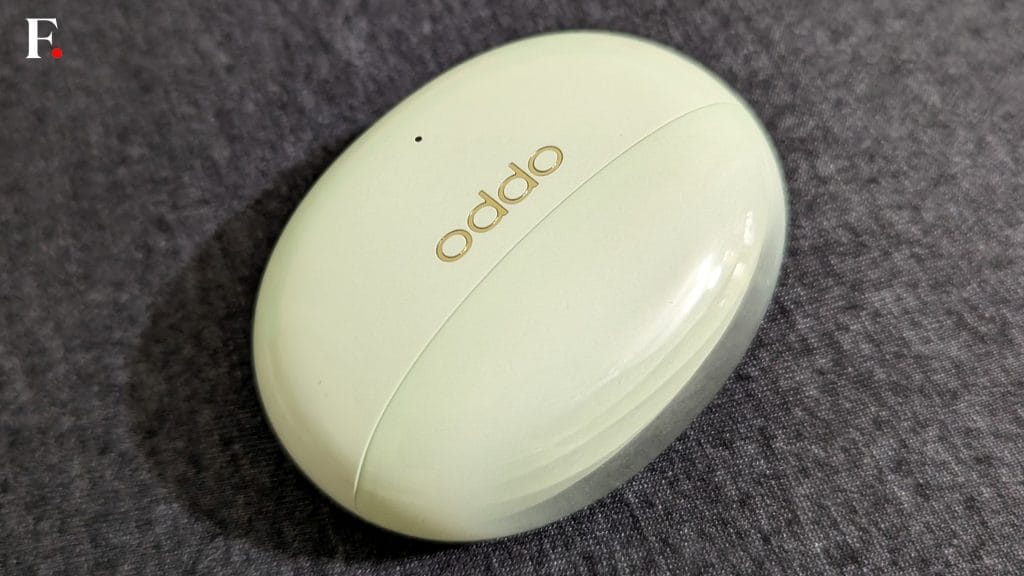
As I mentioned earlier, you also get multipoint or dual-pairing support here. The Oppo Enco Air3 Pro can connect to two devices simultaneously, and it works smoothly. This feature is disabled by default and needs to be enabled from the app. What’s even better is that you can choose LDAC codec for both the connected devices if they support it.
Oppo Enco Air3 Pro: Battery life (7/10)
This is one department where Oppo could have done better I feel. The company promises 7 hours of playback for the buds and 30 hours along with the case, but when using AAC codec at 50 per cent loudness and with ANC off. The battery figures with ANC haven’t been specified, nor when using LDAC codec. That’s where we come in. During our testing, with LDAC codec, ANC turned on at all times and loudness was around 70 per cent, the buds lasted just about four hours, which is average at best.
With ANC turned off, they went on for 5 hours and 45 minutes, which is much better, though not the best in the segment. The case can recharge the buds thrice more, taking the overall battery backup in the range of 16 to 23 hours depending on the quantum of ANC usage. In comparison, its two prime competitors in the segment, Realme Buds Air 3 and OnePlus Buds Z2 manage to last for 18 to 25 hours and 23 to 30 hours respectively, with and without ANC.
Now, the Oppo figures may look lower than its competitors, but those two do not support LDAC codec and were measured using AAC codec. Using AAC, the Enco Air3 Pro may sit right between the two which is a more than decent result. These buds support quick charging too. A 10-minute charge gives you close to two hours of playtime with ANC off. The buds take about 90 minutes to charge fully from zero, while the case takes another 30 minutes. The battery level of each earbud and the charging case can be seen in the companion app.
Oppo Enco Air3 Pro: Price and verdict
The Oppo Enco Air3 Pro can be purchased for Rs 4,999 with a one-year warranty, which is a great price for its performance and the plethora of features it offers. We have already touched upon its two key competitors in this price bracket – the Realme Buds Air 3 and the OnePlus Buds Z2. In terms of pure sound quality and features, the Oppo trumps the other two.
When it comes to ANC, the Realme is marginally better and it is a thousand Rupees cheaper too. OnePlus beats both comfortably when it comes to battery life and transparency mode. It also has a more pronounced bass; not necessarily better but something that will appeal to bassheads more than the other two. While there is no undisputed winner between the three, the Oppo Enco Air3 Pro does have its nose in the front and is well worth its asking price.

